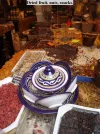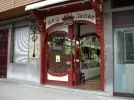What are 'pintxos'? How are they different from 'tapas'? And why is the word sometimes spelt 'pinchos'? Find out on this page.
What Does 'Pintxo' Mean?
'Pintxo' is a 'Basque-ified' take on the Spanish word 'pincho', which itself comes from the verb 'pinchar', which is 'to pierce'. Pinchos are traditionally pierced with a cocktail stick, to attach it to the piece of bread that they invariably came attached to. However, as Basque cuisine has evolved, the food is now less likely to be pierced to a piece of bread than before.
I'll leave it you to decide if the deliberate bastardization of a Spanish word when there is probably a perfectly legitimate Basque equivalent is done to deliberately bait the Spanish or not!
What's the Difference Between Pintxos (or Pinchos) and Tapas?
The difference between a pincho and a tapa is complicated and depends largely on context and location in Spain.
A significant minority of Spaniards (well, I've come across more than one myself) who have not traveled extensively within their own country have the idea that a pincho is paid for and a tapa is always free. This is simply not true.
The basic uses of 'pincho', 'pintxo', and 'tapa' are as follows:
In the Basque Country, you are served 'pintxos'. It is never written 'pinchos' and they are never called 'tapas'. This is the case regardless of whether it is served 'pinchado' to a piece of bread with a cocktail stick or not. Even if you're served a plate of risotto, it's still a pintxo. You will always pay for your pintxo. Find out about the best San Sebastian Pintxo Bars.
In Salamanca, particularly on Calle Van Dyck, you are served pinchos. They are almost always a piece of meat served on a piece of bread. Though not actually 'pinchado' with a stick, this is still close to the original idea of what a 'pincho' is. However, here they are free.
In Granada and Leon (and in some other nearby cities) as well as in some bars in Madrid, a small portion, whether served on bread or not, is a tapa. It is free.
In Seville and other parts of Andalusia, all small portions are called 'tapas'. They are not free.
In many cities in Spain, particularly Madrid, a large portion of, say, calamares, will be called a 'ración', with a half-size portion called a 'media ración' and a quarter-size portion a 'tapa'.
In most parts of Spain, when trying to informally say 'a bit of', for example "Can I have a bit of tortilla please?" you will ask for a 'pincho' - so 'un pincho de tortilla'.

























